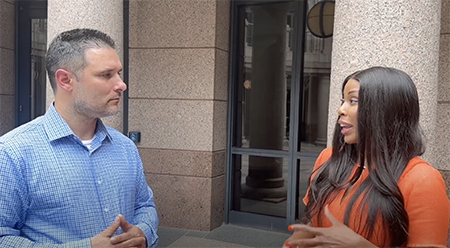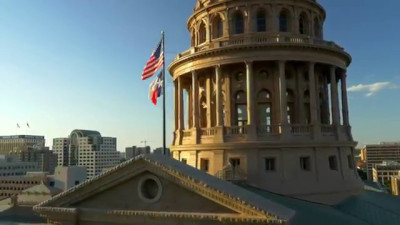Texas House Panel to Study Economic Competitiveness
 In a move many business leaders called “long overdue,” Texas House Speaker Joe Straus has announced a new panel of lawmakers will consider what policies need to be in place – and what kind of policies should be rejected – in order to keep this state a vibrant economic powerhouse for decades to come. As part of his argument, Straus pointed to the fierce competition unfolding across the United States for a massive commercial construction project: Amazon's HQ2, a proposed second headquarters for the tech giant.
In a move many business leaders called “long overdue,” Texas House Speaker Joe Straus has announced a new panel of lawmakers will consider what policies need to be in place – and what kind of policies should be rejected – in order to keep this state a vibrant economic powerhouse for decades to come. As part of his argument, Straus pointed to the fierce competition unfolding across the United States for a massive commercial construction project: Amazon's HQ2, a proposed second headquarters for the tech giant.
"It's time that we re-assert that Texas is fully committed to private-sector growth," Straus said. "There should be no ambiguity that the Texas House will focus on the big and consequential instead of the petty and the polarizing."
The Texas House Select Committee on Economic Competitiveness will be led by Rep. Byron Cook, R-Corsicana, who usually presides over the House State Affairs Committee. "We simply cannot jeopardize the economic engine that has made Texas great for so many years, so it is critical policymakers concentrate on issues that ensure future generations are afforded the same possibilities this state has long enjoyed," Chairman Cook said.
During a speech to the Austin Chamber of Commerce in which he first announced the creation of this committee, Straus said “sometimes, the most conservative solution is for government to not take action that is not necessary.”
Straus was referring to the recently defeated “bathroom bill,” which would have placed restrictions on public restroom access based on gender. The bill was a priority of Lt. Gov. Dan Patrick and enjoyed the tepid support of Gov. Greg Abbott. Speaker Straus personally opposed the bill but agreed to a compromise during the regular session of the Legislature. Patrick rejected that compromise. During a special session, the House declined to address the bill at all.
In his brief remarks to the Austin Chamber, Straus reiterated his longstanding call for business leaders to stay engaged in the legislative process at the Texas Capitol. “Over the summer, that’s exactly what happened,” he said. “Texas employers sent a message about who we are as a state.”
“The bathroom bill can be, and needs to be, a turning point,” Straus said. “The world is watching. CEOs are watching...they need to see that Texas still welcomes them.”
Straus said the argument over bathrooms endangers Texas cities in their bids for Amazon’s second headquarters. The project would bring “$5 billion in construction” to the selected community and as many as “50,000 high-paying jobs,” not to mention the ripple effects in the local and state economy that go along with a development that size. Here's the holdup: Amazon has said it wishes to avoid states with laws that are viewed as discriminatory.
"In the last several months, two unique events, one positive and one negative, have presented themselves to Texans,” Straus said. “First, Hurricane Harvey has caused billions of dollars in damage. Second, a major corporation has proposed a nationwide search for the location of a second headquarters, offering economic benefits equal to the losses caused by Harvey's damage.”
The company said its HQ2 “will be a full equal to our current campus in Seattle. In addition to Amazon’s direct hiring and investment, construction and ongoing operation of Amazon HQ2 is expected to create tens of thousands of additional jobs and tens of billions of dollars in additional investment in the surrounding community.”
“Amazon is not alone in condemnation of the purposeful discrimination hidden behind the controversial Texas bathroom bill,” said Chairman Cook, warning that a “bathroom bill” or any similar proposals should be off the table going forward. “Others who strongly opposed it include our state's top corporate leaders, the Texas Association of Business, college and professional sports organizations, Texas' local tourism industry, and even Gov. Greg Abbott's former campaign treasurer.”
It is important to note that the issue of discriminatory legislation is only a slice of what the Economic Competitiveness Committee is supposed to address.
Per Speaker Straus’ instructions, the Republican and Democratic lawmakers on the panel will look at broad range of topics like “commitments by the state to education and workforce development” as well as infrastructure including transportation, energy, water, and utilities "to ensure capacity to accommodate growing existing businesses and companies settling in Texas.”
The lawmakers will study the availability of investment capital “required to maintain healthy existing companies and newcomers” and “investments in innovation, including barriers to innovation such as unnecessary regulations that would deter or impede the desire of a business to either remain in the state or choose to local here.”
Economic incentive programs will be reviewed as lawmakers look at “existing and potential economic tools to compete or retain jobs, including the appropriate use of those tolls and effectiveness of existing economic development programs."
The lawmakers will also look at “tools and authority of local governments to craft appropriate specific responses to accommodate growing existing businesses and companies settling in Texas” and drill down on “successful and unsuccessful attempts to lure economic development projects to the state or other states, including common themes reported by companies and employees choosing to locate or note locate in a state."
The committee has been ordered to report its findings no later than December 12 of this year.







